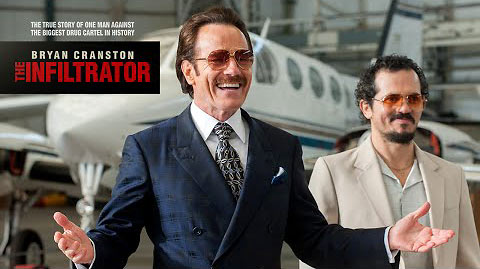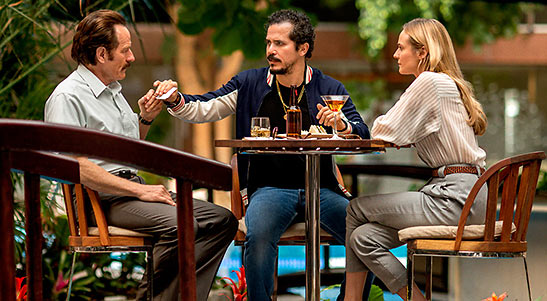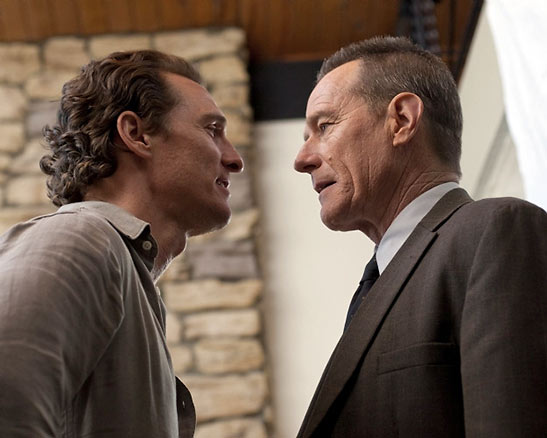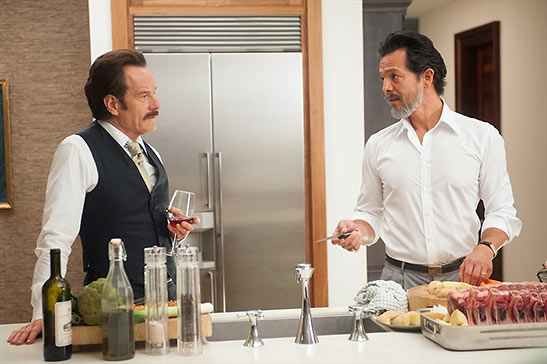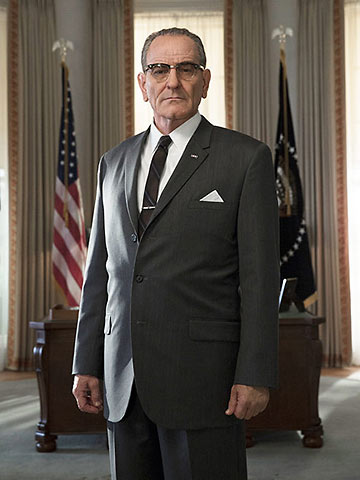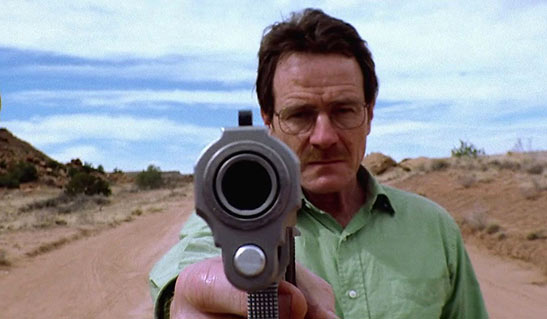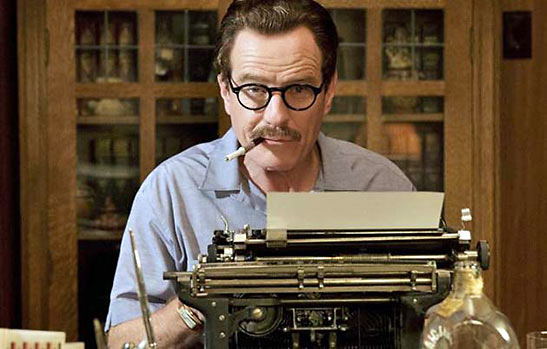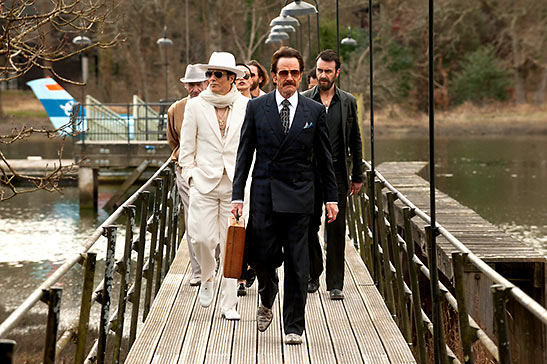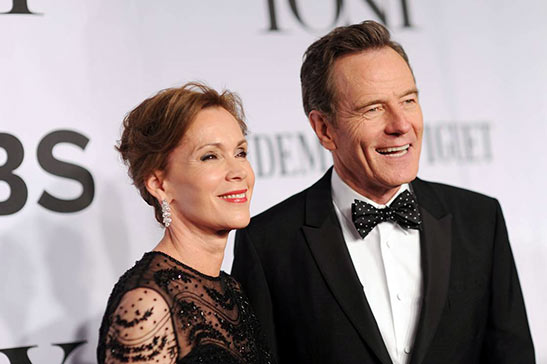 |
 |
|
 |

|
Up Close and Personal
With Bryan Cranston His Personal & Professional Journey Beverly Cohn Part 1: Genesis of "The Infiltrator" & Becoming a Character
The screenplay, based on Robert Mazur's book, was written by the director's mother, Ellen Brown Furman, and is a true story about the undercover work of federal agent Robert "Bob" Mazur. He represented himself as Bob Musella, (Bryan Cranston) a businessman in the money-laundering trade. With nerves of steel, he becomes good friends with Roberto Alcaino, head of the Colombian drug cartel (Benjamin Bratt) and his wife Gloria (Elena Anaya). Eventually, with the help of his undercover partner Emir Abreu (John Leguizamo) and a rookie agent, Kathy Ertz (Diane Kruger,) 100 drug lords, as well as the corrupt bankers who "wash" their dirty money, are captured in one of the most unique busts ever orchestrated. Other members of the cast include: Amy Ryan, Olympia Dukakis, Elena Anaya, Jason Isaacs, Yul Vazquez, Simon Andreu, Ruben Ochandiano, Joseph Gilgun, and Juliet Aubrey as Bob's wife Evelyn. A most charming, articulate Bryan Cranston recently sat down with a select group of journalists to discuss "The Infiltrator," as well as frank revelations about his personal journey and his philosophy on acting. The following has been edited for content and continuity for print purposes.
Did director Brad Furman contact you about starring in this film? Cranston: Yes. Brad directed "Lincoln Lawyer" and we became friends. We wanted to find something we could do together. I think it was two years ago or so and I was doing a play in New York. He said: "I have it." I asked him what he had and he said, (holding up a script) "My mother wrote this." "You're mother wrote this!? (Laughter) "Yeah. She's a good writer." So I said: "Ok. Alright." It's almost like my mother has a barn and my sister has costumes. (Laughter) But, then I read it and said: "You're right. She is good." In reading the book what aspects did you want the screenplay to highlight? Cranston: The book, from Bob's point of view, is focused on the operation, which is very detailed. Anytime you take something from one medium and go to the next, you have to take the original material and put it through a juicer. It takes a big bag of oranges to get a glass of juice. A movie is like juice. You have to take what you consider to be the best elements of the book because you cannot film it in its entirety. The element I really want to bring out is Bob Mazur the man – the husband, the father – because that's what fascinated me. As an actor slipping into a character and playing him is commonplace. I've been acting for almost 40 years and if a scene doesn't work, you just do another take. But for him, if he makes a mistake, there aren't any do-overs. He can be killed. With that kind of tension, coming home every night, how does that guy become Bob Mazur the dad who is asked to help his daughter with math homework? Or make sandwiches for the kids' lunches? Or sit down and have a glass of wine with his wife where she might ask him: "How was your day?" He can't say a word. All he can say is "It was good," even if it wasn't. He's constantly taking in information, stress, and tension and not able to release it. Thank God he was a runner, which was the way he could get it out. I needed this film to show more of the emotional stakes at home. Brad and Ellen agreed that element should really be brought out so that we would have a solid foundation of the plot and the emotional inherent risks.
Did you listen to any of the tapes of conversations Mazur recorded while undercover? Cranston: Yes and it was fascinating. They were not the best quality and you're leaning in desperately trying to understand the conversation as the tapes were always shrouded in a suitcase or in a planter or something. (He changes his voice and muffles it – Laughter) It's like listening to something in a barrel and you can't listen to it too long because you're concentrating so hard on trying to understand everything. Basically, I was fascinated with the depth of informality that Roberto Alcaino (Benjamin Bratt) and Bob had – ribbing each other and acting like good friends. However, Bob never lost his frame of mind – which was that even though he was acting like his good friend, he was going to arrest this guy. For the sake of the movie, theatrical license allowed Bob to relax a little bit of his doggedness as a law enforcement officer and expose more of the fragility of a human being living a dichotomous life. Although he was doing his job, which he knew was right, his body is saying, "But I like him. I feel for them. (Alcaino's family) I don't want to hurt them." You can justify what you're doing intellectually, but emotionally it's a battle. What is your yardstick for knowing when your character takes over?
Cranston: The actor's job begins when you read a script. I first read a script from an objective viewpoint because I haven't said yes yet. If you're walking around during the day thinking about the story, that's a good sign because it's staying with you. If the character starts coming to you, and you start imagining what the character looks like, that's a very good sign as it means that the character is seeping into your life. That's what happened with Walter White ("Breaking Bad,") Dalton Trumbo, ("Trumbo,") and Lyndon B. Johnson ("All The Way"). My receptors are open to those things that I can identify in well-written material. When something resonates, and if something seems honest to me, and if I can bring honesty to that story, then it's a very good sign. What was unique in developing this character? Cranston: It's very easy for me to get into being another character. What I learned from Bob, and what I had to take on, was the specificity of what he had to do. He is a guy, as you see in his manner and demeanor, who is a triple check, quadruple check kind of person – crossing all the "t's" and dotting all the i's" – which was nice as his partner Emir (John Leguzamo) was the opposite. He was an impulsive, spontaneous guy and together they made a very interesting team and are friends to this day. We have that relationship in our movie where they are kind of knocking heads a little bit, which is a more interesting dramatic structure. The truth is they got along and formed a bond pretty quickly, realizing that each one brought a specific set of abilities that the other one did not have. Emir, being that 'let's get into it' kind of guy, was the perfect person to lure the bad guys in. We were fishing and reeling them in slowly, slowly, but like fishing, they could spit the hook and if they did that, after two-and-and-half years of undercover work, we're in trouble. We could also be dead.
What kind of undercover guy do you think you'd make? Cranston: Now I think I'd make a pretty good one. (Laughter) Oh. You meant for real! (Laughter) If I have a bad day I go home and moan about something like "We're going to have to reshoot that scene because it just didn't work." That's the repercussions of my world and I can fully divulge everything to my wife, whether she wants to hear it or not. (Laughter) However, as we know, Bob didn't have that luxury. With all the characters you've played, was there one that was particularly hard to purge from your psyche? Cranston: It's interesting the way film works. We shot "The Infiltrator" over a year ago so you have to reacquaint yourself with the story for publicity purposes because you're onto other projects. But yes. Some characters grab a hold of you and don't want to let go. You enjoy being in their shoes – especially like LBJ for which I did five months of performances – eight shows a week on Broadway. Then we reworked the script and I slipped back into those shoes for the movie. It was fun. It was fun to stay in that character, in that era, in that sensibility, and how the sexual politics were at that time. (He speaks like LBJ) "I like that dress you're wearin'. (Laughter) You're a very strong lead. Do you ever have to tone down your performance in an ensemble situation? Cranston: What you do first is to make sure you understand the story. From there, you compartmentalize it and ask yourself what is my contribution? If it's the lead, you have a larger overview, but if it's an ensemble piece, then you figure out what your character brings to the story. What kind of actors do you prefer working with? Cranston: I like active actors. I don't like to work with actors who walk on the set and go: "Okay. Where do you want me to stand? What do you want me to do? I come in going here's what I've been thinking. Here's what I would like to try. It's a collective and a true collaboration when everybody charged with the story telling process is involved. That extends to the crew as well who could make a suggestion that helps tell the story. So you encourage and embrace everyone and that's how it really comes together. PR Person enters at this point to end the session. I moaned "I had one more question" and gracious Bryan looked at me and said what's your question?
So many Hollywood marriages collapse. What is your secret recipe for balancing home and career? Cranston: I think that's it. It's balance. It's not allowing yourself to get unbalanced for too long. However, it's never balance in the sense that every day is completely balanced. It's finding the right combination over the course of time. The other thing is marrying the right person. Thank you so much for a really fun interview. Cranston: It's been a pleasure. Watch for Part 2 of my interview
with Bryan Cranston in which he talks about his childhood and his path
to stardom. |
This site is designed and maintained by WYNK Marketing. Send all technical issues to: support@wynkmarketing.com

|






